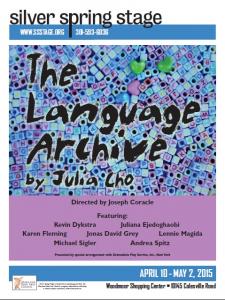What is language if not an act of faith? Take a leap into the language of the theatre and you’ll find yourself pleasantly pleased with Silver Spring Stage’s current production of Julia Cho’s The Language Archive. Directed by Joseph Coracle, this tender tale of words and love finds the soft spot of your heart and whispers the language of true understanding. A carefully crafted touching drama with an exceptional cast guiding the story through an ocean of linguistics, the show is a wonderful experience for those that have words and those that don’t.
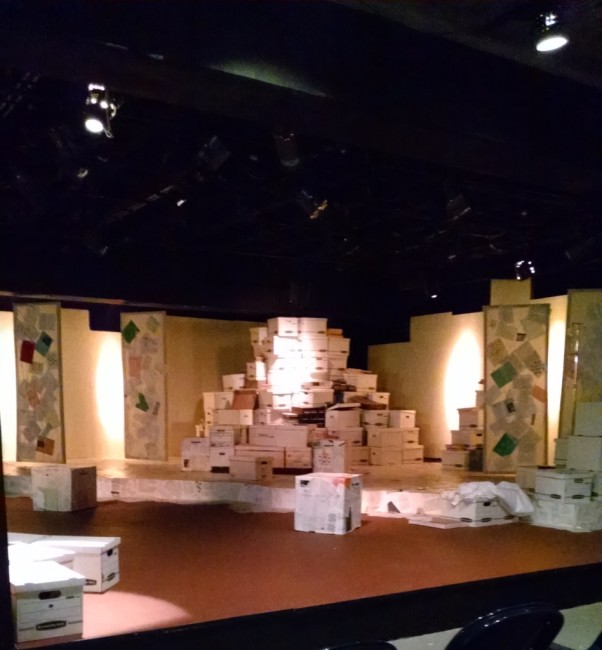
A strikingly symbolic and unique scenic approach is delivered from Set Designer Bill Brown. Papers filled with words spill over the walls and floors as if the archive can no longer contain all of the languages it knows; consuming the existence of reality as words so often do. Brown’s clever construction of furniture out of the innumerably stacked copier boxes helps further the illusion that language creates everything and that words are woven into the fibers of our existence. Between Brown’s representative design work and Director Joseph Coracle’s ability to work the unique spacing of the stage; the production is visually at its finest.
Coracle’s introduction to the piece is cloyingly sweet; a false sense of happiness adorned to the characters before they and their current situation is properly introduced. A wildly humorous and heart-touching series of words displayed as they are found amid the archives of George and Mary’s lives that chronicle their meeting, dating, marriage, and timeline to the start of the play. His ability to block the play; freezing moments out of time while others occur up and down stage makes resourceful use of the space. This also reflections the emotional stresses and strains of the individual characters and their relationships in a visual sense, adding a complex layer of understanding to the performance.
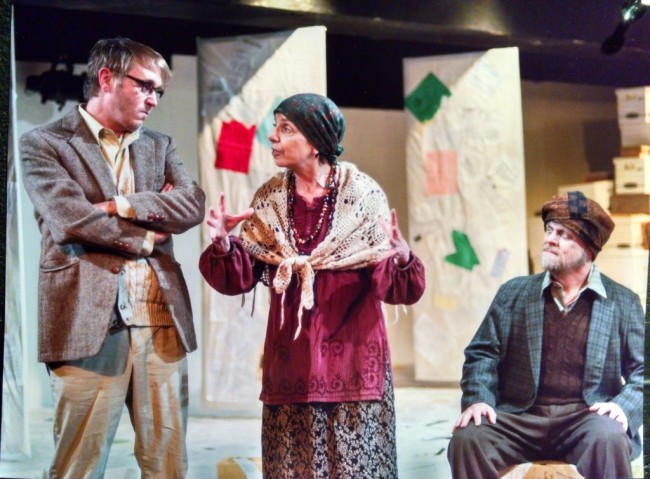
Lighting Designer Peter Caress assists these momentary freezes whether they are tight spot focuses for upstage monologues or broader glowing beams of white every time George has a dream-like sequence. It’s these subtle shifts in ambient tone that guide the play on its emotional narrative, informing the audience with delicate visual cues that things are changing. Aiding with those shifts in a more literal sense is Sound Designer Kevin Garrett. Using Original Music composed by Patrick Hughes, Garrett eases one scene to the next in a fluidity that keeps the show moving as the simplest of scene changes occur. Scenic shifts to the train station are underscored with a light touch, infusing just a hint of background noise to identify the locale.
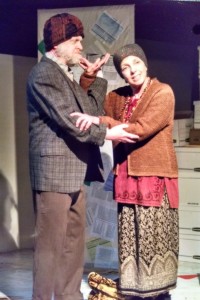
Dialect Coach Gary Sullivan deserves accolades for his work with the cast. Developing distinctive Eastern European sounds for the aging couple that speak the fictitious near-extinct language, Sullivan crafts a unique sound for them to further augment the rare language that they speak. His work with Zamenhof and The Instructor is sound as well, exposing the harsher sounds of their German accents without delay. While Sullivan addresses the aural certitude of the production, Eric Jones covers the intricacies of the aesthetic with his Hair and Makeup Design work. Noticeable mainly on Alta and Resten, Jones’ aging process works miracles to get them looking close to the centenarians that they are.
While the show has lead and supporting roles it is astonishing how well the actors work as an ensemble. Each person in turn brings their own unique performance style to the show, and it is often during their silent exchanges that they understand each other best. This highlights the irony of Julia Cho’s work as it is a play about words and languages but it is during times when those factors are absent that the cast is best understood.
Cameo roles like Emma (Juliana Ejedoghaobi) and The Instructor (Andrea Spitz) bring levity and a sense of emotional angst to the show. Ejedoghaobi is a part of the messy love story that floats through the words of the play while Spitz’ character’s primary purpose is comic relief. Spitz is an curious enigma as The Instructor of Esperanto, the universal language. Like a perpetually shifting plasma that cannot stabilize she churns from strict and succinct to emotionally vulnerable, touching on various melodramatic phases between each transition.
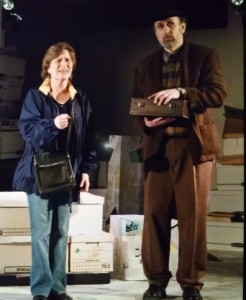
Michael Sigler, who appears first as the mysterious baker and later as a dreamlike encounter of Zamenhof, the inventor of Esperanto, is an eccentricity to the performance that fits in Cho’s carefully constructed world. An enigma, much like Spitz’ character, though in a far different capacity, Sigler provides a touch of whimsy in a truly fascinating and strange fashion. A bit like an oddly warm breeze wafting across an otherwise chilly autumn afternoon, though his encounters are brief, he is keenly felt and appreciated.
Resten (Kevin Dykstra) and Alta (Lennie Magida) have a decidedly unconventional chemistry between them. True to the longevity of a healthy marriage, they bicker and snipe at one another with practiced ease. Dykstra and Magida have a congenial nature on stage about them that carries the marital bliss and comedic marital woes of their characters to the forefront of their performances. Dykstra’s gesticular ability, particularly when trying to warn against Alta’s cooking is hysterical and brings a healthy dose of humor to the tale. He engages forcefully with the story he tells George in the second act; an earnest storyteller that grounds his chimerical excitement in mythological reality.
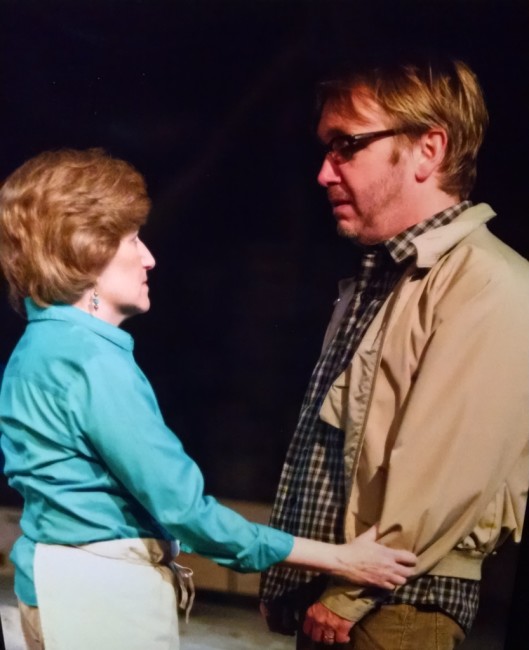
Mary (Karen Fleming) is a sturdy flower starving at the beginning of the production, surviving adversity through its middle, and thriving by the end. Fleming ensures that the character of Mary undergoes a noticeable transformation, fully welcoming the character’s story arc vocally and emotionally. The way she engages in her little audience-based asides draws the attention in a heartwarming fashion. Her rediscovered enthusiasm, which later radiates infectiously throughout the other characters near the play’s end, is thoughtfully genuine. Fleming is emotionally invested in the character’s twisted roller coaster of emotions.
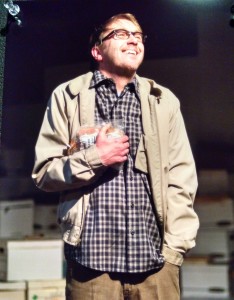
George (Jonas David Grey) is a linguist for whom words fail. Emotionally present, Grey commands the stage from behind the nerdy glasses and awkwardly introverted scientist character. Despite the desperate internalization of George, Grey finds a powerful way to extrapolate his most desperate feelings, particularly during the confrontation scene in the bake shop near the end of the performance. Full physical commitment on Grey’s part results in a great deal of spastic body outbursts that perfectly align with his emotional outpourings throughout. The level of intensity in Grey’s portrayal never falters, only evolves forms from physical expression to vocal eruption. Mastering the nuances of George’s character it is Grey’s performance that drives the show from beginning to end.
Worlds die first, the language will soon follow. The world of this show will die from the Silver Spring Stage in just a few short weeks, and naturally the language of its brilliance will follow. Do not miss your chance to capture such verbose beauty and emotion with your own eyes and ears.
Running Time: Approximately 2 hours and 5 minutes with one intermission
The Language Archive plays through May 2, 2015 at Silver Spring Stage— 10145 Colesville Road in Silver Spring, MD. For tickets please call the box office at (301) 593- 6036 or purchase them online.

